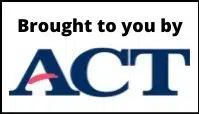My son is starting high school this fall. I get anxious anytime my kids begin a new educational chapter, but somehow this one feels bigger because … college is on the other side. The truth is, I’m clueless about where to start. Do I need to start thinking about college his freshman year? What does each step in the process look like? What should we do first?
To get some college admission tips, I caught up with Ashley Mannka, senior director of strategic marketing at ACT. Not only was she able to answer my questions, but she pointed me to some awesome resources I’ll be able to use throughout my son’s high school years.
Early High School Is About Exploration
Mannka tells me that, yes, I do need to start thinking about college, but freshman year is more about brainstorming and envisioning than anything else. Phew!

“There are a multitude of factors to consider, and I would say you know your child best,” says Mannka. At first, do some basic brainstorming about things like what they might like to major in, what type of school they think would be a good fit (liberal arts vs. STEM, for example), and whether they see themselves at the local university, or a school halfway across the country.
Each year into high school, their college search will become more specific, and will include things like visiting college campuses and comparing degree programs. But freshman year is a good time to simply explore.
3 College Admissions Tips to Keep in Mind at the Beginning
Just because freshman year is more exploratory in nature doesn’t mean there aren’t things to put on the to-do list. Mannka shared some insider tips that newbies like me don’t always have on their radar.
1. Build Up the College Resume
Working on their college resume is something they can start working on freshman year. But advise them to think quality over quantity. Colleges would rather see one or two things they’re deeply interested in, rather than a long list of accomplishments, Mannka says.
2. Don’t Forget About Recommendation Letters
People think of recommendation letters as something you secure when you start working on your college application. But the process starts in early high school and involves your student building strong relationships with a teacher or two. “One of the things a lot of students do is wait until they’re going to apply” says Mannka. “And then they’re like, ‘I guess I can ask my math teacher from last year, but I didn’t really have a strong relationship with him or her.’” It pays to think ahead a bit on this, so when the time comes, the ask won’t be so awkward.
| [adrotate banner=”221″] |
3. Your Child’s Standardized Test Score May Shape Their College Decision
As Mannka points out, you can’t fully narrow down your college search until you get your child’s standardized test score. Knowing how closely their score align with students who are most commonly accepted may help them decide if a school is a safe bet, a likely admit, or a reach. Most kids take the ACT in the spring of their junior year, but that doesn’t mean you can’t start familiarizing yourself with the exam at the beginning of high school. The ACT website has a free study guide which includes a free practice ACT test to get them started.
Start Gathering Resources Now
What about parents? This is a great time for us to start gathering resources to help us get our heads around the college application process. No, we’re not the ones applying, but we do need to be positioned to guide our students on this journey.
Mannka pointed to an excellent resource on the ACT website—a newsletter parents can sign up for as soon as their child enters high school. When a parent signs up for the newsletter and enters their child’s graduating class, they’ll receive a monthly newsletter curated with tips based on the appropriate stage of the process for your student.
She also referred me to a college planning checklist broken down by high school year (freshman, sophomore, etc.) that gives specific guidance about what parents should be researching and exploring during each stage of high school.
“These checklists provide content for what you should consider in the fall, what you should consider in the spring, and so on,” Mannka tells me. “It helps get students thinking about what each step in the process looks like.”
After receiving these college admissions tips from Mannka, I definitely feel more confident about the whole process. I’m glad that freshman year is more about exploring than anything else. I’m also relieved to have an idea of what the journey ahead looks like—and most importantly, where to go if I need more information and support.




